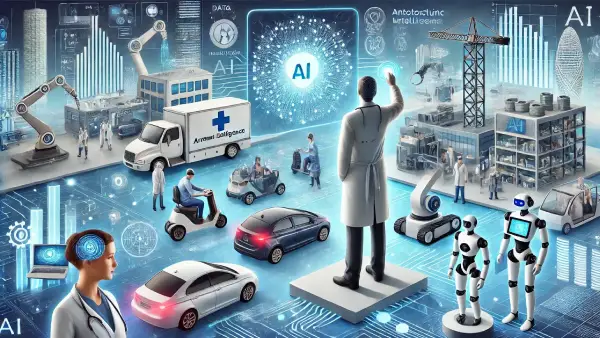Introduction to Artificial Intelligence
Artificial Intelligence (AI) is a transformative technology reshaping various aspects of modern life. Its rapid evolution has led to significant advancements across numerous fields, offering new capabilities and efficiencies. This article explores AI’s definition and historical context, the types of AI, and its profound impact on society and industries.
Defining AI and Its Historical Context
Artificial Intelligence, or AI, refers to machines’ simulation of human intelligence, especially computer systems. These intelligent processes encompass learning (gathering information and the rules for its application), reasoning (applying rules to draw approximate or definite conclusions), and self-correction. The primary aim of AI is to develop systems capable of performing tasks that necessitate human-like intelligence, including visual perception, speech recognition, decision-making, and language translation.
The origins of AI can be traced back to antiquity, with myths and legends about artificial beings. However, AI as a formal field of study began in the mid-20th century. In 1956, John McCarthy coined the term “Artificial Intelligence” during the Dartmouth Conference, marking the beginning of AI as a scientific discipline. This conference brought together leading researchers who set the foundational goals for AI, focusing on creating machines that could simulate human reasoning and problem-solving.
Types of AI: Narrow vs. General AI
AI can be categorized into two primary types: Narrow AI and General AI.
Narrow AI
Narrow AI, or Weak AI, is created to carry out a specific or limited set of tasks. These systems operate under narrow constraints and cannot perform tasks outside their predefined capabilities. Examples of Narrow AI include virtual assistants like Siri and Alexa, recommendation algorithms used by streaming services, and autonomous vehicles. These AI systems excel in their specific domains but lack generalization capabilities.
General AI
General AI, Strong AI, or Artificial General Intelligence (AGI) denotes a theoretical system capable of understanding, learning, and applying knowledge across a wide array of tasks, akin to a human. AGI would be able to perform any intellectual task that a human can. While Narrow AI is already present in many aspects of our daily lives, General AI remains a concept for the future, as creating such a versatile and adaptive system poses significant scientific and ethical challenges.
Impact of AI on Society and Industries
Integrating AI into various sectors has led to transformative changes, impacting society and industries in numerous ways.
Healthcare
AI is revolutionizing diagnostics, treatment planning, and patient care in healthcare. AI algorithms can precisely analyze medical images, aid in early disease detection, and customize treatment plans using individual patient data. AI-powered systems are also enhancing drug discovery processes and optimizing hospital operations.
Finance
The finance industry benefits from AI through improved fraud detection, algorithmic trading, and customer service. AI systems can analyze vast amounts of financial data in real time, identifying fraudulent activities and making trading decisions faster and more accurately than human traders. Chatbots and virtual assistants provide personalized customer support, improving user experience.
Manufacturing
In manufacturing, AI-driven automation enhances production efficiency and quality control. AI-powered robots perform repetitive tasks precisely, reducing human error and increasing output. Predictive maintenance algorithms monitor equipment health, preventing breakdowns and minimizing downtime.
Transportation
AI is at the forefront of advancements in autonomous vehicles, traffic management, and logistics. Self-driving cars use AI to navigate and make real-time decisions, potentially reducing accidents caused by human error. AI systems optimize delivery routes and manage fleet logistics, improving efficiency and reducing costs.
Education
AI in education offers personalized learning experiences, automated grading, and administrative support. Intelligent tutoring systems adapt to each student’s needs, offering personalized content and feedback.
AI-driven analytics help educators identify learning gaps and improve instructional methods.
Conclusion
Artificial Intelligence is a pivotal force driving innovation and efficiency across various industries. AI’s capabilities transform how we live and work, from healthcare to finance, manufacturing to transportation, and education. As AI technology advances, it promises remarkable progress but also presents ethical and societal challenges that need to be tackled. Embracing AI’s potential while ensuring its responsible and ethical use will be essential for creating a future where AI benefits all of humanity.




